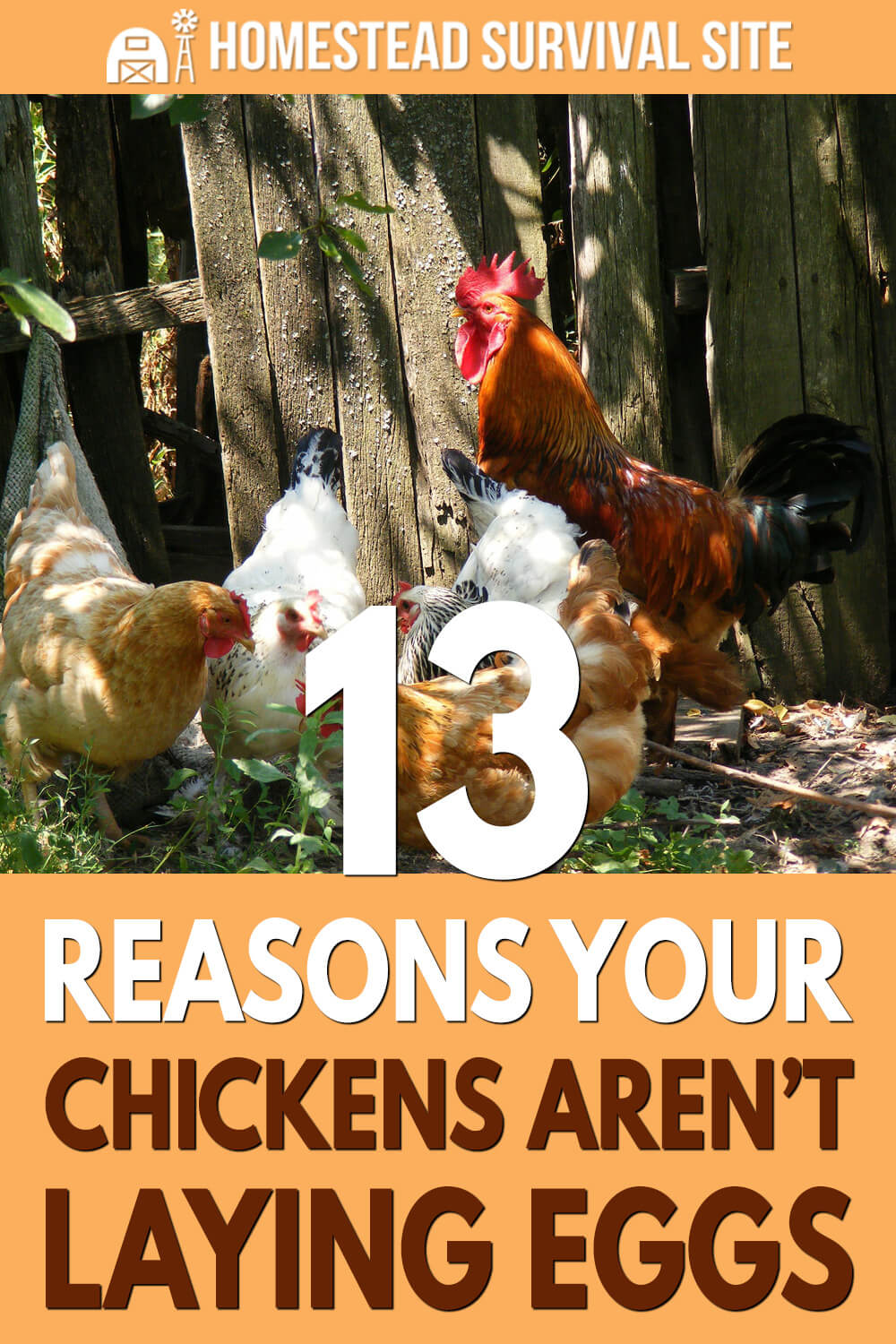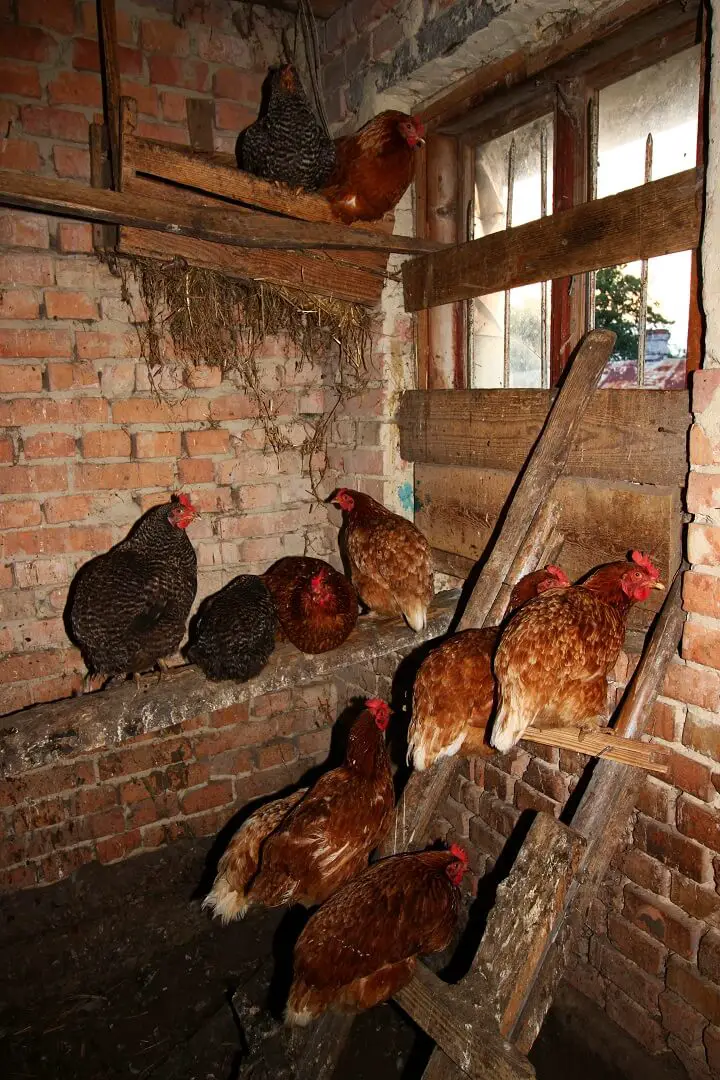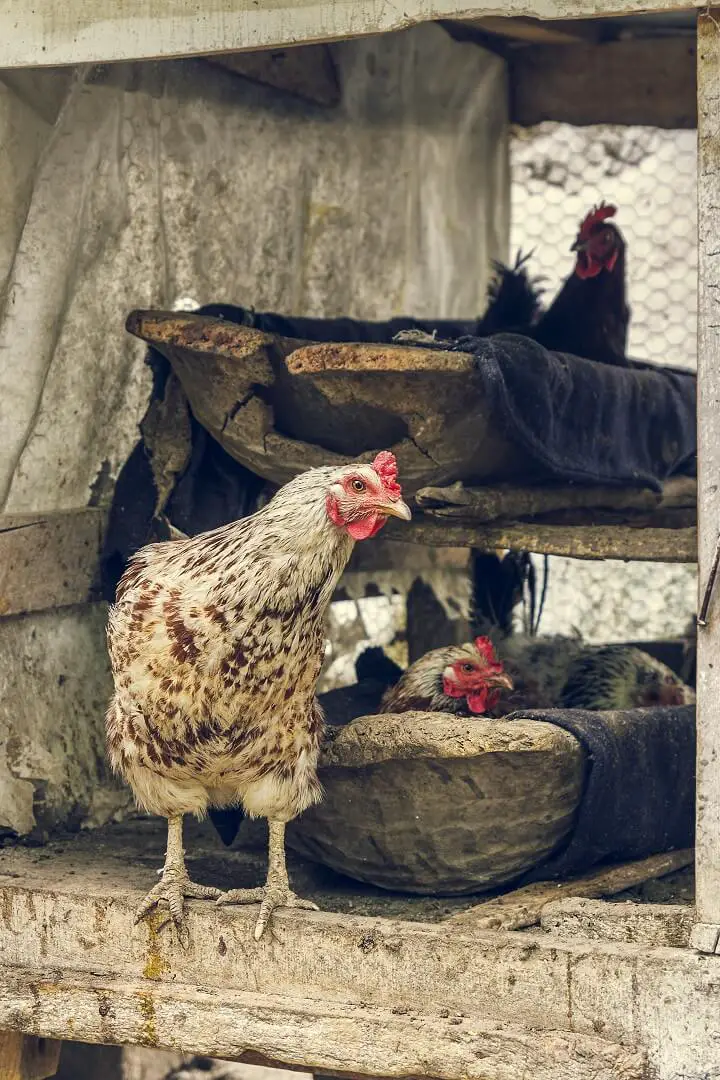[ad_1]

When eggs suddenly seem to stop appearing at the rate they had previously, this can be concerning. It is vital to know when a gap in eggs can be normal and when a shortage is a cause for concern.
Want to save this post for later? Click Here to Pin It On Pinterest!
The most important way to distinguish an issue is to have an idea of which chickens are laying, how often, and how many eggs a chicken may lay in the first place.
How Many Eggs Does a Chicken Lay?
Depending on the breed, some chickens will lay up to 300 eggs a year (like hybrid breeds such as the Golden Comet), while others may be closer to the 200 range (like a Plymouth Rock or Ancona), so know your breeds to have an idea of what to expect from a healthy hen.
Knowing the egg schedule of your chickens is also important to ensure that your chickens are laying as expected. Depending on the breed, most chickens will start laying eggs at around 6 months of age. Some smaller breeds may start sooner, while some heavier birds may be a bit older.
Typically, once a hen starts laying eggs, they will lay another egg every 26 hours. Due to this timeframe, the following day may result in a later egg laid. Sometimes this may make eggs alternate by day.
When a hen has not laid an egg in more than this time period, there may be something wrong. Knowing the cause will help you determine if there is something to fix or if it is simply the natural timetable of the bird.
Reasons Your Chicken May Stop Laying Eggs
1. Age
Though chickens can continue laying eggs most, if not all of their life, they will lay fewer eggs per year. Egg farmers often only keep their chickens for 2 years due to mass production.
On your homestead, older chickens will continue to lay if all other factors are in line for a healthy hen. Pay attention to your chickens’ rhythms and make room to understand that it may vary by year.
2. Stress
Chickens can experience stress individually and as a flock. Just like humans, stress can affect their overall health, including egg-laying. Nicknaming someone a” chicken” who is fearful has a reason! Chickens are easily startled and a bit fearful by nature.
A disturbance, whether predator, insect, temperature issue, grooming, or other change to a routine may cause stress for your chickens. If you suspect your chicken is not laying eggs due to stress, it is likely that if the issue remains unresolved, your chicken may encounter other health issues. As much ease and routine as possible for the chicken coop is ideal.
3. The Coop Dynamic Has Changed
Adding more chickens to your coop changes more than the number of beaks to feed. Chickens are social creatures, and they enjoy company. With the hierarchy of the family, chickens create a pecking order for food, water bowls, and even their egg-laying.
Even with no disturbances of chickens added or lost, the pecking order may gradually change as some birds get stronger or weaker. These pecking order changes can affect egg-laying. Unless there is bloodshed, you can leave your chickens to naturally work out this king-of-the-hill situation until a new normal comes over the flock.
4. Molting
Chickens will lose their feathers and regrow them, called molting, twice a year. This natural process is affected by daylight and will take place in spring and fall.
While going through molting, chickens may experience a temporary halt in egg production while they save their nutrients and energy for the process. Egg-laying should resume as normal once they are through the molting season.
5. Diet
Healthy egg production is dependent on quality chicken nutrition. If a chicken is deficient in a vital nutrient, they may stop laying as frequently. Consider that what you feed your chickens also affects the quality of what is passed into their eggs.
A variety of chicken-safe fruit, vegetables, and plenty of protein are requirements for healthy chickens. Chickens also need grit and plenty of fresh water.
6. Dehydration
In warm weather, chickens need plenty of water to prevent getting dehydrated. Sometimes birds at the top of the pecking order may try to prevent others from accessing water. The first sign of chicken dehydration is a drop in egg-laying. If it is warm, set up water stations so there is plenty for all the birds.
In winter, you will need to take preventative action to ensure the chicken’s water does not freeze. When you let your chickens out during the day, put their water out in the sun. By keeping food and water outside of the coop, you will be able to monitor the water temperature easily.
Using rubber water stations may help keep the water from freezing. If you have electricity in your coop or chicken run, a heated water station is another option.
7. Sunlight Changes
Though this would not halt egg production indefinitely, short days of natural light can stop egg production for a few months. Typically, as your birds become of age to lay, you want to make sure they are receiving 14-16 hours of light per day. The light exposure rouses the flock to come in and lay.
If you have less natural sources of light for this time allotment, you will need to provide supplemental lighting in the hen house to continue the laying season. Be cautious using artificial light with young chickens because doing so can cause them to attempt to lay an egg before they are ready, resulting in a stuck egg, or egg binding.
8. A Stuck Egg
A few factors can cause an egg to become stuck inside, and it is as unpleasant as it sounds. The most common issues include calcium deficiency, an infection, an odd-shaped or large egg.
Paying attention to the flock will help you determine quickly if this is the problem as the chicken will be in distress in walking, sitting frequently, or lacking consistent bowel movements.
If you suspect this issue, start with a calcium supplement and some quiet isolation for the chicken. If they continue to have issues, you can lower the chicken into a warm bath to help ease the egg out.
If the chicken still cannot pass the egg, you may need to make a call to your vet as this can become fatal if left untreated.
9. A Broody Hen
A broody hen is a chicken that has the hormone and temperature increase to prepare her to sit on eggs. It can be quite rewarding when eggs are fertilized and you are ready for more chicks in the family. Watching a mom hen with her baby chicks is a joyful part of caring for a flock. However, if you are needing eggs more than chicks, a broody hen may get in the way.
Often, you may want to break the behavior of the broody hen. If you have no roosters, you know your eggs are not fertilized, which may cause stress for the mom waiting for hatchlings.
When a broody chicken claims a popular laying spot, they may prevent other chickens from laying, resulting in fewer eggs for you. The hen may also get sick from mites, or from not cleaning herself as she normally would be due to sitting in one place.
There are several ways to stop a broody hen. If you have time to monitor, remove the hen from her nest whenever she goes to sit. Be sure to remove all eggs as soon as they are laid to help her fight the urge. Encourage the hen to leave the coop, even if you are carrying her out.
You can offer special treats to lure her out because less time sitting will help her fight the urge. She will resist, but consistency will help change the behavior.
For a hen that is fighting your attempts to separate, you may want to create a physical separation from the nests by putting her in an isolated crate. Consider elevating the crate to keep airflow to help lower the chicken’s temperature.
A broody hen has an increased temperature, and finding ways to bring that down may help snap her out of it. You can also give the hen a cool bath if weather temperatures are warm enough to do this humanely.
10. Parasites or Sickness
It can be easy for chickens to become sick with worms or other parasites and sicknesses. Naturally, a disturbance in chicken health may result in less egg production. Keeping an eye on the overall behavior of your chickens will help you notice if your chicken may be sick.
Certain parasites can cause different symptoms, so knowing your chicken will help you diagnose and treat. Make sure your coop has plenty of ventilation because chickens can also be prone to respiratory sicknesses. If you feel your chicken is sick, the best course of action will be your veterinarian.
11. The Coop Is Inadequate
Some intentional thought in the building of the chicken coop will help the productivity of your chickens laying eggs. If you feel egg production is not where it should be, check that your coop meets some basic requirements.
A chicken coop should offer shelter from the elements, enough that the birds feel protected, but it needs to still have ventilation. Some ventilation should not be cut off in winter. Chickens can handle cold weather, but more ventilation will pull moisture out of the shelter as cold and damp can be detrimental for chickens.
Because chickens’ egg-laying is dependent on quality light exposure, set up your coup facing the sunniest side of your yard. And finally, ensure proper predator protection to all elements of your coop. To increase chicken health and happiness, consider offering plenty of perches for the chickens to sleep on and huddle during a cold night.
12. Hidden Eggs
Chickens will typically stick to laying eggs in their nesting boxes if there are enough provided. Sometimes chickens may choose elsewhere, making it harder to find their eggs.
If you feel your chickens are laying less, or you notice that they are laying outside of the nesting boxes, start by replacing the nesting material. If the material has mites, chickens may avoid it. For new egg layers, you may need to train the chicken where to lay. Adding a decoy egg to the nesting box will help.
If you have a hen who has made her own nest in the yard or garden, block off her access to the nest and cover it with something like wood to make it inaccessible. If she is routinely not laying in her nesting box, you may need to keep her inside for a day or two until she builds the habit of laying where you want her to. Luckily, chickens are routine animals, so once you’ve established the right routine, she should be consistent.
If you are finding hidden eggs, consider how often you are egg collecting. Collecting eggs once a day should be enough to not have overcrowding in the nesting boxes. Though a chicken will lay on top of eggs, too many in the nest may discourage her.
13. Dirty Nests
Chickens won’t lay in a nest that is too dirty. Once a week, replace the nesting materials to help encourage the chickens to keep utilizing their nests.
Final Thoughts
Chickens will naturally have brief seasons of a break in laying. Noticing the pattern of what is going on with the flock will help you determine if there is anything to worry about or if it is just one of the natural ebb and flow of their egg-laying cycles.
Paying attention to your chickens’ pattern will help you be the best determiner of how to keep the eggs in your basket.
Like this post? Don’t Forget to Pin It On Pinterest!
[ad_2]
Source link
Get more stuff like this
in your inbox
Don't Be Left Unprepared
Thank you for subscribing.
Something went wrong.







